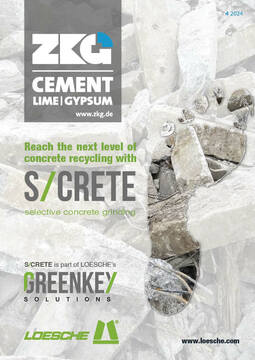Austria’s first polyolefin processing plant
ARA patent heralds a new era
in plastics recycling
Not all plastic packaging is recyclable – if it is too dirty, too small or consists of different chemical substances, packaging is sorted out and then thermally recycled. ARA has now developed a process to also recycle these sorting residues. Austria’s first polyolefin processing plant will be launched in Pöchlarn, Lower Austria, in summer 2024. ARA has already applied for an EU patent for this innovative process.
The state-of-the-art plastics sorting plant operated by ARA and its partners Bernegger and Der Grüne Punkt will go into operation in Upper Austria in 2024. High-tech processes will achieve a sorting depth of 80%, which is unique in Austria. The remaining 20% consists mainly of so-called mixed plastic fractions, which can no longer be sorted in an economically viable way. These residues consist of different types of plastics and differ in their chemical and physical properties. This means that valuable secondary raw materials are lost.
With Austria’s first polyolefin processing plant, UPCYCLE in Pöchlarn, Lower Austria, recovers up to 50% of the recyclable materials from these sorting residues that were previously thermally recycled. “It is of key importance to keep raw materials in the cycle for as long as possible and thus achieve the ambitious EU targets for plastic packaging at the same time. Our new process is an important step towards achieving both goals,” explains ARA CEO Martin Prieler.
New process gets even more out of
the yellow garbage can
Both mixed plastic fractions from the yellow bag and fractions from commercial collections are processed. “The result of the treatment process is high-quality polyolefin recyclates with a purity of at least 90%, which are then mechanically or chemically recycled by the industry as secondary raw materials,” says Prieler. While mechanical recycling involves shredding, melting or reshaping the waste, chemical recycling converts plastics back into their basic components at a molecular level.
The location of the UPCYCLE plant in Pöchlarn, Lower Austria, was strategically chosen in the spirit of a 360-degree circular economy. “We have succeeded in creating a unique cooperation between the municipality, waste disposal companies, the cement industry and other partners,” explains Prieler.
The new processing plant is operated by SRP Sekundär Rohstoff Produktion GmbH, while Kirchdorfer Zement – a specialist in binding agents and environmentally friendly cement – is responsible for the CO2-optimized thermal recycling of the residual fraction that cannot be further recycled.
Plant can process five tons per hour
“With a processing speed of five tons per hour, the capacity of the polyolefin processing plant is up to 30000 tons per year,” says SRP Managing Director Richard Walter. “This means we can handle a significant proportion of the annual volume of mixed plastics produced.”
The European petrochemical industry has already tested the end material and given it a positive assessment for use in chemical recycling. The high demand confirms the quality of the product. “We assume that the UPCYCLE project will meet our high expectations and pave the way for further plants in and around Austria,” says Prieler.


